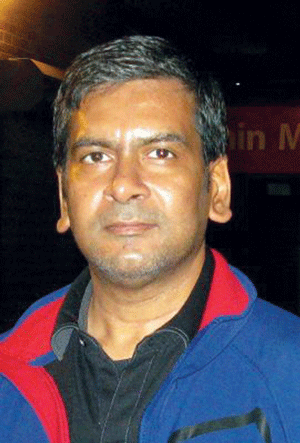
BY LINCOLN ANDERSON | In a tragic story that sent a shockwave of fear through the city and resonated around the world, Sunando Sen, a 46-year-old immigrant, was killed last week, when he was pushed in front of a subway in Queens by an emotionally disturbed woman.
Sen’s death is being felt especially deeply in the East Village, where he worked for years at New York Copy and Printing Co., on E. 11th St. between Second and Third Aves.
Early Wednesday morning, a memorial note to Sen along with flowers and yellow ribbon were taped to the wall outside the store’s entrance, while on the shop’s front counter votive candles flickered amid a collection of cards left by friends and customers.
Bidyut Sarker, the printing shop’s owner, was opening up for business.
“He worked here for 16 years,” Sarker said, congenially.
About three months ago, Sen left the E. 11th St. shop to start his own printing store up by Columbia. According to Sarker, Sen had suffered a mild heart attack and figured he’d be able to work a little less hard if he ran his own business. Plus, Sarker admitted, the printing business is “a bit slow” right now, so it was better that Sen struck out on his own. Ironically, once Sen had his own shop, he found himself working harder than ever, Sarker said.
They still stayed in touch.
“He helped me all the time,” he said. “I called him just a few days ago. He was the one who kept all the computer files.”
Sen, who was from India, and Sarker, from Bangladesh, shared a common language and religion, Hinduism. A friend had pointed Sen in Sarker’s direction when he needed work. He had been studying economics at New York University and knew nothing at all about computers and printing. But he threw himself into the job and became a self-taught expert, Sarker said.
“All the networking, Web sites, he set it up for me,” he said.
It had been a wrenching week for Sarker and other friends of Sen.
The entrepreneur was killed Thurs., Dec. 27, after being pushed by Erika Menendez, 31, of the Bronx, who was later arrested after being ID’d from surveillance camera footage of her fleeing from the scene.
Sen’s funeral was Sunday. Monday, per Hindu custom, his cremation ceremony was held. Finally, on Tuesday, there was a ritual service at which the slain man’s soul was “released,” hopefully clean of sin, hopefully to attain nirvana.
“We believe in reincarnation,” Sarker explained. “We are asking for God to release his soul so he doesn’t have to come back.”
One hundred fifty to 200 people turned out for the final service.
“A lot of customers show up also,” Sarker said.
He was very touched by the diverse outpouring of mourners, including from different religions.
“A Buddhist monk pray, a Muslim imam,” he said. “A customer who is Jewish — she went there and prayed for him.”
Lorcan Otway, the proprietor of Theatre 80 on St. Mark’s Place and a Quaker, also attended the ceremony. He recalled Sen as being like “the Indian Gregory Peck.”
“You can see him on Channel 5,” Sarker noted of the news coverage.
Otway worked with Sen on aiding Hindus facing oppression in Bangladesh.
Also paying his respects was Art Baron, who plays sax with Bruce Springsteen and leads the Duke’s Men, a a group of Duke Ellington band alumni.
As the memory of all the friends and customers at the service came flooding back, Sarker was for a moment suddenly overcome by emotion. He bowed his head and brushed a hand slowly through his hair.
Sebastian Beckwith entered the store and gave Sarker a hug, offering words of support. Working with Sen, he used to do “layouts and photos” for tea labels and such for his company, In Pursuit of Tea.
“He was just low-key,” Beckwith recalled of Sen.
“Very low-key,” the shop’s owner agreed. “He had no fight with anyone. He never meant for harm to nobody.”
News reports variously quoted Menendez as saying she shoved Sen to his death because since 9/11 she has hated Muslims, or both Muslims and Hindus.
But Sarker said Hinduism is a peaceful faith. And he can’t believe Menendez initially said she hated Hindus, but feels she must have added it to her rant only after she was informed it was Sen’s religion.
“Name of Hindu never associated with violence in the world,” Sarker declared. “Hindus are mostly vegetarian — we don’t kill any animals for food. … The implication of Hindu with terrorism is wrong.”
Meanwhile, while Sen’s soul hopefully has been cleansed of sin and attained a transcendent state of rest, the same can’t be said for Menendez.
“She is probably taking his sin,” Sarker said of his departed friend and his troubled killer.
Sen’s was the second fatal subway push last month in New York City. On Dec. 3, Ki Suck Han, 58, was hurled to his death by Naeem Davis, a 30-year-old homeless man. The two had argued moments before Davis heaved Han onto the tracks in front of an oncoming train.
The spate of high-profile subway incidents has sparked a debate about whether the city should install platform barriers, such as exist at certain train stations in some other cities, including Paris, London and Tokyo.


































